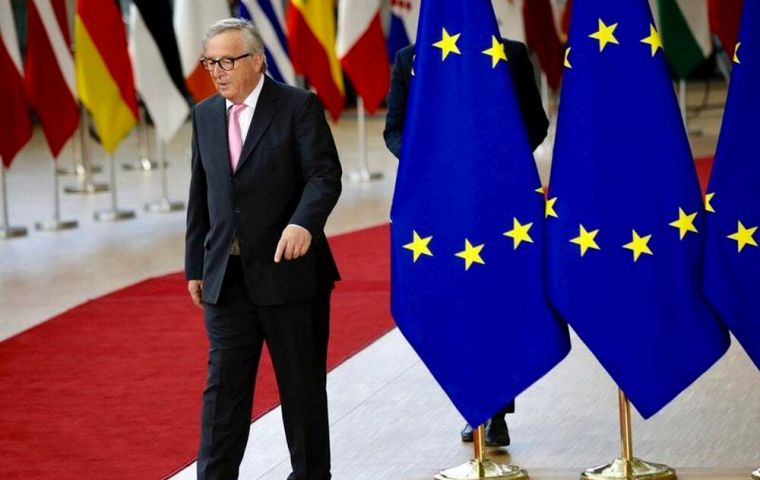MercoPress. South Atlantic News Agency
EU leaders can´t agree on the European Commission's top jobs
 The rare Sunday summit was called because EU leaders failed on 20 June to agree on candidates for the Commission president's job and other top posts
The rare Sunday summit was called because EU leaders failed on 20 June to agree on candidates for the Commission president's job and other top posts EU leaders are meeting in Brussels in a new effort to decide who should get the EU's top jobs, including a successor to Commission chief Jean-Claude Juncker. Centre-right leaders from the EU's biggest political group played down the chances of agreement on Sunday on a new Commission president.
Summit chair Donald Tusk was reported to be proposing Dutch centre-left politician Frans Timmermans for that post, as part of a balanced package. But there is intense national rivalry. Mr Timmermans, a veteran of Brussels politics, is already a deputy to Mr Juncker. However, politicians in Poland, Hungary and Romania dislike the way he has enforced the EU rule of law policy.
The centre-right European People's Party (EPP) nominated Germany's Manfred Weber for the top job.
He is the candidate under the “Spitzenkandidat” (lead candidate) procedure, which the European Parliament supports as a democratic way to reflect the European election outcome.
But while the EPP got the most votes in the May elections, it does not have a majority, and French President Emmanuel Macron is among those opposing the “Spitzenkandidat” system.
The elections saw big gains for the liberals - including Mr Macron's alliance - and Greens, so the long-established centre-right and centre-left blocs can no longer dominate EU business. Nationalists also made gains.
The Commission drafts EU laws, oversees national budgets, enforces EU treaties and negotiates international trade deals.
The rare Sunday summit was called because EU leaders failed on 20 June to agree on candidates for the Commission president's job and other top posts: European Council president (to replace Donald Tusk); high representative for foreign policy (to replace Federica Mogherini); European Parliament president and European Central Bank president.
The leaders are beginning a working dinner, later than scheduled. If necessary the talks will continue at breakfast on Monday, Mr Tusk says.
“The vast majority of EPP prime ministers don't believe that we should give up the presidency quite so easily, without a fight,” said Irish Taoiseach (prime minister) Leo Varadkar.
German Chancellor Angela Merkel has long backed Manfred Weber for the top job, pitting her against President Macron and other critics who argue he lacks the necessary experience, as he has never held a government post.
Arriving at the Brussels summit, Mrs Merkel said “it looks like the talks won't be very easy”.
Another EPP politician, Latvian Prime Minister Krisjanis Karins, said “we need a good balance, a good geographical balance, a good political balance, I think it's good to look for a good gender balance... ”Let's see how far we get, but it's that balance that I don't see crystallizing.“
The top EU appointments - especially for Commission chief - sharpen not only national rivalries but also those between the European Council and the European Parliament, which is the only directly elected EU institution.
The ”Spitzenkandidat“ procedure was launched by the parliament in 2014, so keeping it is a matter of pride for MEPs. But Mr Macron stressed the need to nominate two men and two women for the four key posts. The fifth - parliament president - is mainly in the hands of MEPs.
EU rules demand that the top appointments achieve a balance of geographical spread, big and small countries and gender.
Reuters news agency, quoting Brussels diplomats, says the plan backed by Mr Tusk would give Mr Weber the post of parliament president, and make Mr Timmermans - who has strong French and Spanish support - Commission president.
However according to Bloomberg news in that scenario Belgium's liberal Prime Minister Charles Michel would succeed Mr Tusk as European Council president and the foreign policy post would go to Bulgaria's Mariya Gabriel, a centre-right politician like Mr Weber.
But Hungary's government spokesman Zoltan Kovacs tweeted that appointing Mr Timmermans to the top EU job was ”completely unacceptable”.




Top Comments
Disclaimer & comment rulesCommenting for this story is now closed.
If you have a Facebook account, become a fan and comment on our Facebook Page!